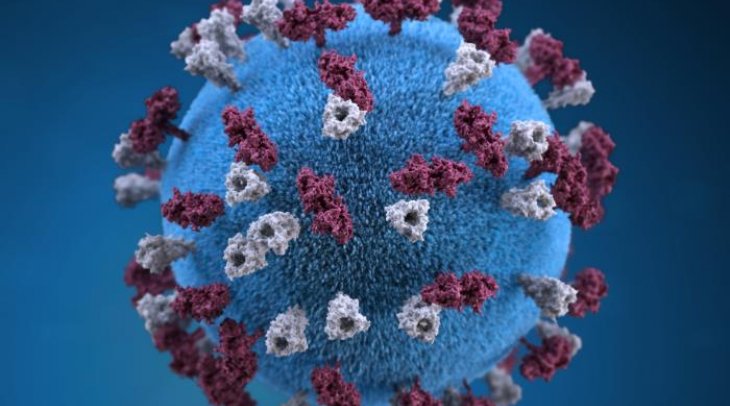Measles

What is measles?
Measles is a highly contagious, vaccine-preventable disease caused by a virus.
What are the symptoms of measles?
Measles starts with a fever and at least one of the "three C"s: cough, coryza (runny nose), and conjunctivitis (red, watery eyes). Several days later, a rash can develop that starts on the face and spreads over the body.
How is measles spread?
Measles is a highly contagious virus that lives in the nose and throat mucus of an infected person. It can spread to others through coughing and sneezing. Also, measles virus can live for up to two hours in an airspace where the infected person coughed or sneezed.
What are complications from measles?
Many people with measles often have complications such as diarrhea, ear infections or pneumonia. Measles can also cause brain infection that can lead to permanent brain damage. Pregnant women with measles are at an increased risk of early labor, miscarriage and low birth weight infants. Measles can be more severe in people with weak immune systems. Some people with measles may need to be hospitalized and in some cases, measles can lead to death.
How long after being exposed to measles do symptoms begin?
The first symptoms typically appear 7-14 days after exposure, but can appear as long as 21 days after exposure.
What should you do if you develop symptoms?
- If symptoms develop, immediately please call your doctor, urgent care or emergency room. Please call ahead of your visit so they can take precautions to prevent exposure to other individuals.
- Stay home if you are sick and do not allow visitors in your home, as measles is highly contagious.
How long is a person with measles contagious?
A person with measles can pass it to others from four days before a rash appears through the fourth day after the rash appears. A person can be infected with measles just by being in a room with an infected person, even up to two hours after the infected person has left.
Who can get measles?
Anyone who has not received two documented doses of MMR vaccine or has not had measles infection can get measles. Two doses of MMR vaccine are 97% effective against measles. If exposed, approximately 90% of those who are not immune to measles will develop the disease.
What is the best way to prevent measles?
- Measles is preventable by the MMR vaccine. If you are healthy and know you have had two doses of MMR vaccine, you do not need to take any additional actions. If you are unsure if you were vaccinated, or unsure if you had measles in the past, contact your healthcare provider about getting vaccinated.
- CDC recommends that children get two doses of the MMR vaccine. The first dose is recommended at 12-15 months of age, and the second dose at 4-6 years of age.
- CDC recommends children 6-11 months old who will be traveling internationally or to areas in the U.S. that are currently experiencing an outbreak receive one dose of MMR before travel. These children will still need the two routine doses given at 12-15 months and 4-6 years of age.
- Additional CDC recommendations are made for certain groups, including students at post-high school educational institutions, healthcare personnel, and adults who do not have evidence of immunity. More information can be found here.
- Current recommendations about the measles vaccine in the Baltimore area, including who should not get the MMR vaccine, can be found here. MMR vaccines should not be administered to women known to be pregnant or attempting to become pregnant.
Importance of the Measles Vaccine:
- In the United States, measles was considered eradicated in 2000, when there were just a few dozen cases. There were 644 cases of measles in the United States in 2014.
- Prior to 2019, there were no reports of measles in Baltimore over the past 10 years.
- There is no scientific evidence that vaccines will cause autism or poisoning. In fact, vaccines save thousands of lives in the U.S. every year.
